Observance
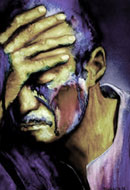 Among the Mourners of Zion
Among the Mourners of ZionWednesday, April 11, 2012 by Micah Stein | Jewish Ideas Daily » Daily Features
We are a nation of mourners this month, collectively observing the Jewish rituals of grief in memory of . . . well, something or other. The occasion for mourning is the Omer, which began on Saturday night; the reason for mourning is more mysterious.
 Redefining Religious Activity
Redefining Religious ActivityFriday, February 17, 2012 by Meir Soloveichik | Jewish Ideas Daily » Daily Features
In August of 1790, Moses Seixas, a leading member of the Hebrew Congregation of Newport, Rhode Island, composed a letter to then President George Washington, who was visiting Newport. In his letter, Seixas gave voice to his people's love of America and its liberties.
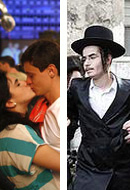 In God They Trust?
In God They Trust?Thursday, February 9, 2012 by Elliot Jager | Jewish Ideas Daily » Daily Features
Stick an average alumnus of the Israeli public school system into a synagogue during morning prayers, and chances are they would be bewildered. Even if they could recollect an arid Bible class they had to endure long ago, what good would it do them? They'd still be lost.
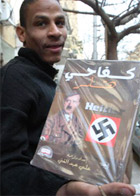 Whose Holocaust?
Whose Holocaust?Friday, January 27, 2012 by Margot Lurie | Jewish Ideas Daily » Daily Features
For much of Europe, today is the UN-designated International Holocaust Remembrance Day. Secretary-General Ban Ki-moon has dedicated his address this year to children murdered by the Nazis, with the message that "the best tribute to the memory of these children is an ongoing effort to teach the universal lessons of the Holocaust, so that no such horror is visited upon future generations."
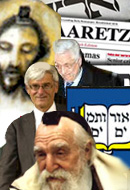 Highlights of 2011:
Highlights of 2011:Part II
Friday, December 30, 2011 | Jewish Ideas Daily » Daily Features
Part II of our round-up of the past year's most popular features on Jewish Ideas Daily. (Part I is here.)
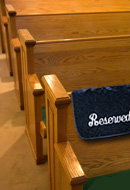 Pay to Pray?
Pay to Pray?Wednesday, September 28, 2011 by Jack Wertheimer | Jewish Ideas Daily » Daily Features
In the middle decades of the 20th century they were called "mushroom synagogues." They popped up in the waning days of summer to provide High Holiday services, then disappeared at the conclusion of Yom Kippur. Today, "mushroom synagogues" are once again in vogue—but with a critical difference.
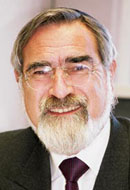 Rosh Hashanah with the Chief Rabbi
Rosh Hashanah with the Chief RabbiTuesday, September 20, 2011 by Lawrence Grossman | Jewish Ideas Daily » Daily Features
Ten years ago, the first day of Rosh Hashanah—the two-day Jewish New Year—fell on September 18. That was one week after September 11, 2001, when almost 3,000 people were killed by Muslim terrorists. On that Rosh Hashanah, rabbis did not lack for sermon topics.
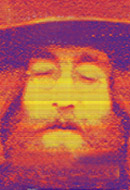 John Lennon and the Jews
John Lennon and the JewsFriday, August 5, 2011 by Aryeh Tepper | Jewish Ideas Daily » Daily Features
"It's not cool to be Jewish, or Negro, or Italian. It's just cool to be alive, to be around." So said Aretha Franklin. I know, because my father used to have the soul diva's wisdom hanging on the wall of his study at home. He also used to walk around in a t-shirt with "Miscegenate" emblazoned across the chest.
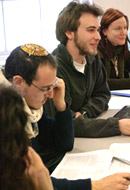 Reconstructing Judaism
Reconstructing JudaismWednesday, August 3, 2011 by Joseph J. Siev | Jewish Ideas Daily » Daily Features
At a time when all three major Jewish denominations in America—Orthodox, Conservative, and Reform—find themselves in a state of deep internal fracture, a fourth and much smaller movement, Reconstructionism, has just voted to create a unified body to coordinate the activities of its lay and rabbinical arms.
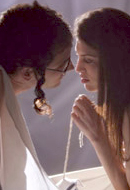 Lives of the Ex-Haredim
Lives of the Ex-HaredimTuesday, August 2, 2011 by Joshua Halberstam | Jewish Ideas Daily » Daily Features
"Wherefore art thou Romeo?" Juliet calls out in pristine Yiddish from the heights of her fire escape. Melissa (Malky) Weisz, who plays Juliet in the recent film Romeo & Juliet in Yiddish, probably asked the same question in a more vernacular Yiddish—and with very different expectations—in her earlier life.
Editors' Picks
The Carp in the Bathtub Alan Deutschman, Salon. In the Brooklyn of the writer's youth, they didn't know from ahi tuna, but carp made good pets—and great gefilte fish, too.
Trailing the Rabbis' Breadcrumbs Judith Shulevitz, Tablet. What is man? He who is capable of searching inside himself. What does he search for? Some dark or foreign matter that he has put there himself. With what does he search? The light of God, which is also in himself.
A Series of Unfortunate Segments Leon Wieseltier, Jewish Review of Books. There is immodesty in the notion that newness, and one's own signature, will suffice. The New American Haggadah is abundantly a labor of love, but love is not enough.
Freedom Tales Yehudah Mirsky, Jewish Ideas Daily. From a medieval manuscript to the script for an interfaith seder, a new crop of Haggadot shows that the old words still hold their own.
Making a Hash of the Haggadah Michael Medved, Commentary. The impulse to revise and update the prescribed Passover service remains unquenchable, yielding results that range from the odd to the preposterous.
Is the Kotel Plaza a Synagogue? David Golinkin, G’vanim. How should the State of Israel respond to the increasing religious policing around the Western Wall that is slowly but surely turning the area into a Haredi synagogue? (PDF)
Sha-bot Gil Student, Torah Musings. Can a robot be a Shabbos goy? The question is not simple, but it is not without Talmudic precedent.
Radical Orthodoxy Daniel Boyarin, Book of Doctrines and Opinions. The Talmud scholar imagines a religious practice, "free of the ethnocentrism and even racism that characterizes so much of contemporary orthodox language . . . that would authentically enable my own radical political commitments." (Interview with Alan Brill)
Choose Your Poison Philologos, Forward. Why do some say l'chaim when blessing wine: to confirm that the drink hasn't been poisoned, to dispel grim associations, or simply to make sure that all present are ready for the blessing?
Faith is Not Quite the Word Martha Himmelfarb, Daily Princetonian. The scholar of religion talks about Israel, interreligious friendship, trends in American Judaism, and her own practice, including saying kaddish for her father, sociographer Milton Himmelfarb. (Interview by Robert George)

